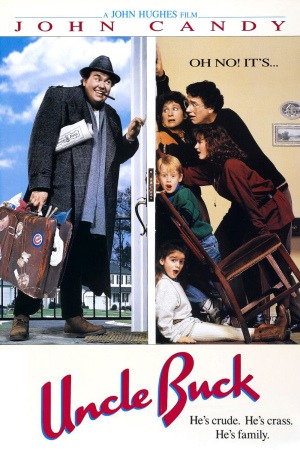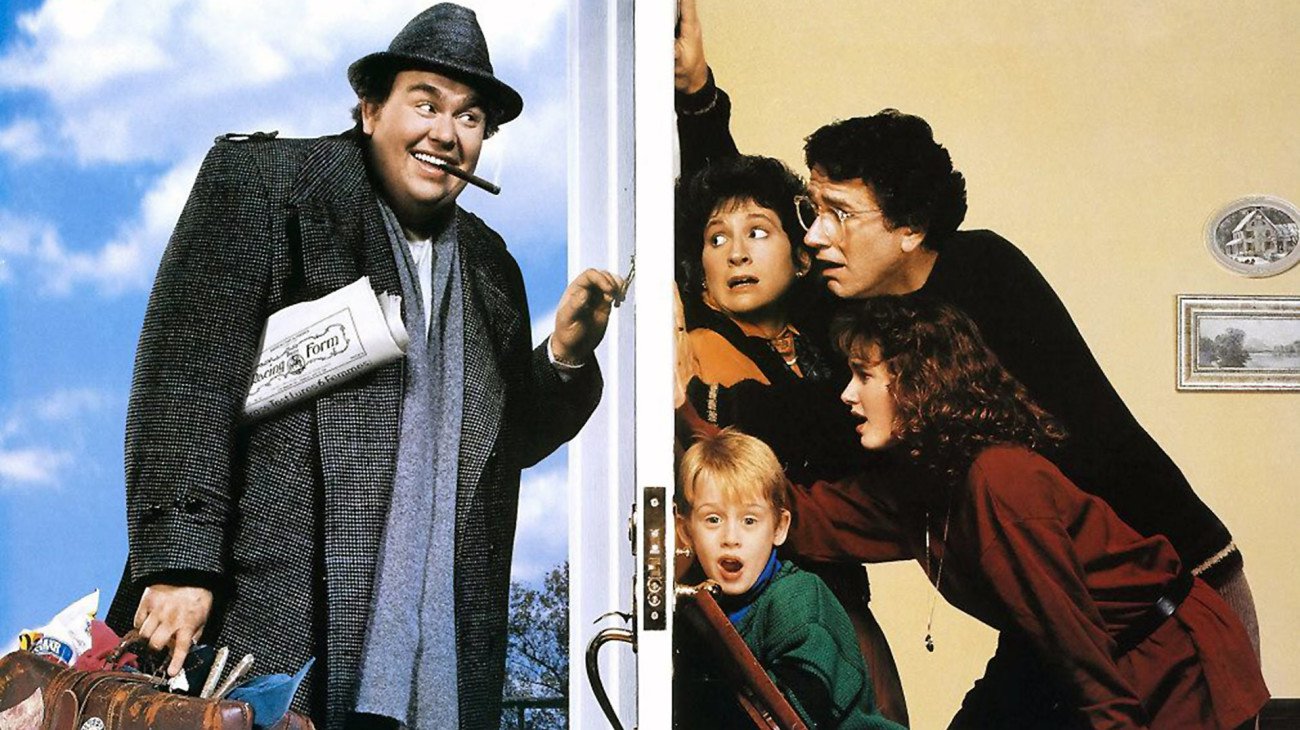
John Hughest Retrospective: Funny uncle
What was then longest gap in between Hughes Entertainment productions - from June, 1988, to August, 1989 - ended with Uncle Buck, a movie that does not necessarily benefit from having been so long in the hopper, nor from what we can presumably refer to as John Hughes's creative exhaustion at the close of the '80s - an impression strengthened when we observe that 1990 would end up being the first calendar year of Hughes's directorial career in which he did not release a movie.
The fact of the matter is, Uncle Buck is really not a successful movie; it's all over the map tonally, ricocheting from magical realism to soft 'n fuzzy family drama to wacky comedy to wacky comedy tinged with the cartoon logic of magical realism. But it is the very way in which it is unsuccessful that makes it absolutely, magnetically fascinating, perhaps the strangest movie in Hughes's body of work, and though parts of it are unabashedly off-putting, it is not, like She's Having a Baby, unsuccessful and therefore tedious. In fact, being unsuccessful is its saving grace: a more straightforward & "functional" Uncle Buck might have looked vaguely like Mr. Mom, a manically cheery farce that you giggle at and then forget, but the Uncle Buck we have is infinitely more memorable and captivating.
On Chicago's North Shore (allegedly, the film was going to be filmed in St. Louis until unseasonably warm weather forced the production to move back to Hughes's hometown - I find this mildly unbelievable), the Russells, Bob (Garret M. Brown) and Cindy (Elaine Bromka), are in a bind: her dad has just had a heart attack and they need to drive to Indianapolis NOW. The only solution at the ungodly hour when they start making calls is Bob's brother Buck (John Candy), a professional gambler with a seedy bachelor's apartment in Chicago - right across from Wrigley Field, in fact, not a place you are likely to be able to afford if your lifestyle is like Buck's, but maybe it was different in the '80s - whose arrival in the Russell home causes a certain measure of cautious enthusiasm in the younger kids, Miles (Macaulay Culkin) and Maizy (Gaby Hoffmann), and a full serving of outright loathing from 15-year-old Tia (Jean Louisa Kelly), who already resents her parents and throws herself full-time into proving to Uncle Buck that she'll have none of his rules, to which he responds by doubling-down on anything he can do that he knows will embarrass her in front of her obvious bad-news paramour, Bug (Jay Underwood).
The joyous incoherence of Uncle Buck starts with the apparent fact that it has two entirely distinct movies contained within (three, counting the tacked-on subplot about Buck's slow romance with a garage owner played with enjoyable brusqueness by Amy Madigan): first is the tale of a wacky, life-affirming uncle whose surface coating of cynicism is just a dodge that quickly breaks away - this is the movie that has Buck making a mountain of comically gigantic pancakes, or suggests that he is in possession of a clapper that can turn on all the lights at Wrigley Field, or shows how he does laundry in the microwave since he can't get the washing machine to work. Second is a story, at times extremely shrill and dark, about an adult calling out an angry teenager on all her bullshit, and the torturous, even poisonous relationship between them. It's not the case that the movie can't fuse these two storylines, or that the jump from one to the other is jarring: Hughes doesn't seem to so much as notice that there even are two movies, and simply acts as though it's the most natural thing in the world to jump from the cartoon escapades of Buck and family (in the tone of The Great Outdoors, Hughes's previous screenplay to see production, or rather less promisingly the Home Alones and Beethovens to come) to an adult/adolescent showdown so bitter that nobody even bothers to shout at each other.
The parts of the movie relating to Buck and Tia are unlike anything else in Hughes's career: what it is, in fact, is the basic stuff of his iconic teen angst movies told from the opposite perspective - now we are siding with the grown-up authority figure who was, in Sixteen Candles or The Breakfast Club or Ferris Bueller's Day Off mocked or vilified as being arbitrary, simple-minded, and horribly unwilling to understand the delicate mind of a teenager. It is laudable of Hughes to make the attempt to revisit his pet theme in such a radical new way, but I think that's exactly what explains most of Uncle Buck's problems: a lack of nerve, maybe, similar to the one that sent the hurtful drama about a strained marriage depicted in She's Having a Baby into the shoals of loopy, broad comedy. Except that the characters in Uncle Buck are better-written and better-acted (especially in the case of Buck himself, the third John Candy performance in a row for John Hughes that so effectively exploited the actor's natural gentility and humanism in the service of a farcical character who was not also a caricature), and thus the serious bits are more lacerating, while the comedy is more aggressively silly than in anything Hughes had done to that point outside of Ferris Bueller, and thus the mismatch is even more pronounced, though it's that same exaggeration in both directions, I think, that makes Uncle Buck so much more watchable than the director's previous misfire.
The comic material largely works: it is a bit fluffier even than the "gee, let's all have fun!" screwing-around in The Great Outdoors, but Candy's excellent comic presence makes everything better, and his chemistry with Culkin in particular is a small miracle: their first meeting is a comic banter scene, aided to a huge effect by whiplash editing, which as a triumph of both filmmaking and acting is one of the funniest moments in Hughes's filmography. It is ditsy, that is to say, but not as lightweight and vacant as much of what Hughes would churn out in the 1990s. Parts fall entirely flat - one intensely weird moment has Maizy being accused of blasphemy in class, which has absolutely nothing to do with any other line of dialogue anywhere in the picture - but for the most part, it is charming and watchable and not terribly memorable.
Whereas the dramatic material does not work: Hughes quickly looses the thread of what he's doing - he was never a good with drama, it not suiting his natural inclination to be nice to his characters (that's why only The Breakfast Club has deep-down Serious Moments that come even close to working - and I don't think it works even there, but I know that I am alone - it's his only drama where he can sympathise with every single major onscreen character) - and things become far more rancid than you'd expect from a movie that falls into the broad genre of movies about an adult and an intractable teen quarreling and then making up; it's a miracle, frankly, that Tia doesn't stab Buck in his sleep. Some of this might well be Kelly's rough performance, the first she ever gave - comparatively, Culkin and Hoffmann were old pros - but that, too, is a matter of directing, in its own way.
In fact, the dark bits of the story get so dark that Hughes can't even find his way out of them: he has to stage the reconciliation between uncle and niece partially offstage, so that whatever happens to her that makes her soften toward Buck is left sufficiently vague that we can comfort ourselves by saying that she was probably not raped. Let us not even bother getting into the stuff of hugely problematic representations like that, however; it is enough of a dramatic misfire that there is no moment in which we see Tia grow, simply that she drifts into a scene having already down her growing. Probably because there was no way to show that process convincingly, and so Hughes had to role the dice on the audience's not caring about a change in the girl's character so complete that she's barely recognisable as the same person.
Insofar as Uncle Buck was trying to do something new in Hughes's career, then, it fails; and yet it is always the case when a filmmaker has a distinct personality that his or her mistakes are sometimes the most revealing. For all his lack of a particularly sharp aesthetic (though Ralf Bode's unsentimentally grainy, musty cinematography is about as visually distinguished as anything in a Hughes movie ever got), Hughes certain has a very particular mentality as a storyteller, and the ways that Uncle Buck flails about when it gets outside of that mentality would make it an essential piece of the man's canon even if he hadn't directed so few movies that virtually all of them count as key films. There isn't much to love about the movie besides Candy's excellent performance - his last lead role in a film written by Hughes - but there is a hell of a lot to pay attention to; this is one of the most peculiar "family" movies of the late 1980s, and well worth attention as a fascinating departure from the norms of that typically-unthreatening boilerplate genre.
Categories: comedies, domestic dramas, john hughes, shot in chicago, warm fuzzies






